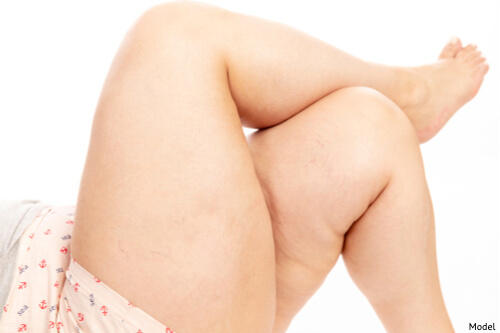Posted February 13, 2020 in Lipedema
2 Min Read:
Women and young teens commonly confuse obesity with a severe condition called lipedema.
This condition can affect a woman’s self-esteem and cause confusion when it comes to figuring out why her body appears disproportionate.

Liposuction is proven to treat and relieve the physical and emotional discomfort caused by lipedema.
What Is Lipedema?
Lipedema, which causes fat deposits to be distributed in large amounts in the buttocks or legs, can cause weight gain, pain, and swelling. A woman can have a defined upper body and a disproportionate lower body due to lipedema.
Lipedema means ‘fluid in the fat,’ and likely develops when a woman:
- Begins her first menstruation cycle
- Becomes pregnant
- Grows older
This condition is commonly misdiagnosed as obesity. The fat deposit in the buttocks and legs will not respond to diet and exercise and can lead to extreme discomfort.
Lipedema can also be paired with other complications, including:
- An underactive thyroid gland
- Depression and migraine headaches
- High blood pressure
- Diabetes
How Can I Treat Lipedema?
Liposuction has been proven to be an effective method for treating lipedema and relieving the pain, bruising, and swelling caused by the condition.
A recent study published by the American Society of Plastic Surgeons found treating lipedema with liposuction reduced the frequency and severity of migraine attacks.
Patients in this study underwent multiple sessions of liposuction to treat the fat deposits on the thighs, calves, buttocks, and abdomen.
On average, these patients saw the removal of 10 liters of fat, but this was much higher in some patients, according to the study’s findings.
What Are the Other Benefits of Liposuction?
Aside from treating conditions like lipedema, liposuction can be used to remove stubborn fat deposits after massive weight loss.
This procedure permanently removes fat cells and improves body contours.
Liposuction can also treat:
- Gynecomastia—Localized fat deposits in the male chest area
- Extreme weight loss after obesity—After massive weight loss, it is common for fat deposits to remain
- Lipomas—Benign, fatty tumors
- Lipodystrophy syndrome—Occurs when fat accumulates in one part of the body and is lost in another
Want to Learn More About Liposuction?
If you want to learn more about liposuction and its benefits, call our office at (225) 412-4774 or schedule a consultation with us online today.